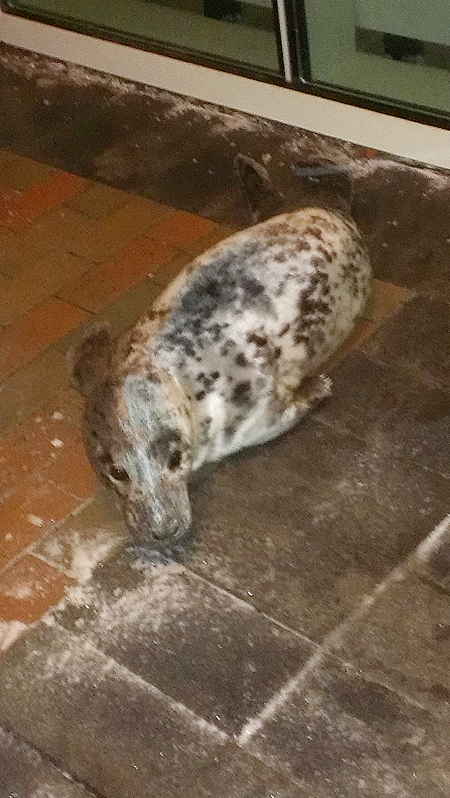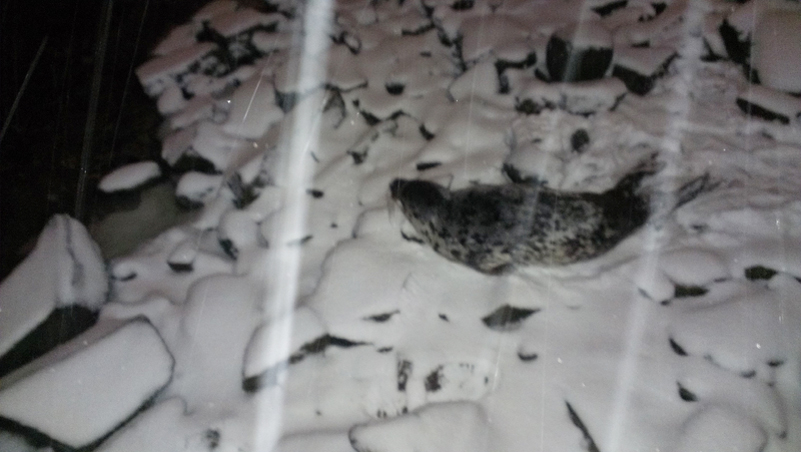PORTLAND — Mercy Hospital had an unusual visitor early Friday: a young gray seal that managed to negotiate the Fore River Parkway and climb the hill to the hospital’s main entrance.
The seal was discovered about 4 a.m. by a crew with Seabreeze Property Service, which maintains the hospital grounds and was there to clear snow.
“When I first saw it, it looked like somebody snuggled up in a blanket, wiggling around,” said Mike Therrien of Buxton, who works with the company.
Therrien said the seal, almost 3 feet long, appeared to be bleeding slightly from the mouth. That may have been because the seal was eating snow and ice, the workers were told later.
When the female, only a few months old, started working her way farther inland, Therrien and three other workers blocked its path.
“We sort of guided it back down the hill,” across the street and into the Fore River, he said. “It lunged a few times at my shovel.”
The seal seemed to resist the bare pavement, but when the workers used shovels to put snow in front of it, the seal quickly slid over it, he said.
It appeared oblivious to the dangers of the road and “really didn’t seem too interested to be back in the water,” Therrien said.
But once it was in the river, the seal swam off, he said. It all happened within about 25 minutes.
When they discovered the seal, the workers notified hospital security, which called Portland police, who then notified Marine Mammals of Maine.
The organization’s executive director, Lynda Doughty, started to come in from Phippsburg, but by the time she got to Yarmouth, the seal was back in the water.
Doughty said it’s not unusual for seals to pull themselves out of the water to rest or regulate their temperature. They need to be in the water only to feed, and sometimes they need a break, she said.
Marine-mammal groups say people who discover seals should generally leave them alone.
If a seal appears injured or sick, a person should notify one of the organizations that responds to distressed seals.
In southern Maine, Marine Mammals of Maine can be contacted at (800) 532-9551.
“This time of year, the species that we deal with tend to be a little wayward. Sometimes they just get a little off track,” Doughty said.
Gray seals are born in the period from January to March and stay with their mothers for three weeks, she said.
“The species we see this time of year are a little hardier than the harbor seals born in early summer,” she said. “They have more of an attitude. They’re well suited to the conditions we see this time of year.
“We just responded to a young gray seal this week on the back porch of somebody’s cottage in Cape Elizabeth,” Doughty said.
The male seal was taken to the University of New England’s Marine Animal Rehabilitation Center in Biddeford, according to the group’s Facebook page.
Doughty said marine-mammal responders like to get an assessment of a seal and its condition before deciding what to do with it, in case it needs rehabilitation.
“Most people are well meaning in trying to help the animal,” she said, but it’s usually best to leave it where it is.
She said it’s unlikely that she would have left the seal at the hospital entrance, and if it was healthy she would have helped it back to the water.
David Hench can be contacted at 791-6327 or at
dhench@pressherald.com
Send questions/comments to the editors.




Success. Please wait for the page to reload. If the page does not reload within 5 seconds, please refresh the page.
Enter your email and password to access comments.
Hi, to comment on stories you must . This profile is in addition to your subscription and website login.
Already have a commenting profile? .
Invalid username/password.
Please check your email to confirm and complete your registration.
Only subscribers are eligible to post comments. Please subscribe or login first for digital access. Here’s why.
Use the form below to reset your password. When you've submitted your account email, we will send an email with a reset code.